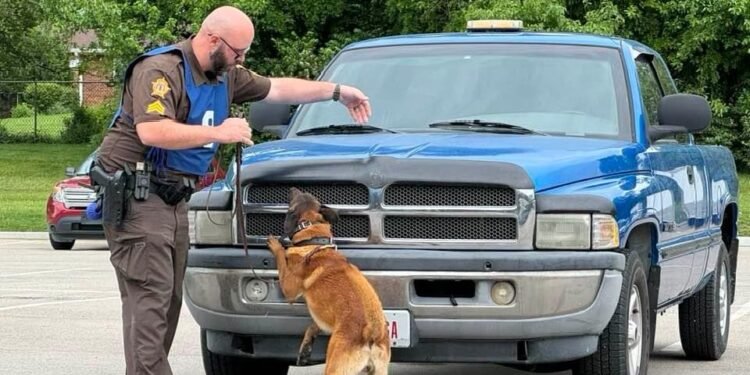Two of Henderson County’s most beloved law enforcement officers won top awards recently in a regional certification and competition in Ohio.
Brix, age 4, and Kari, 7, both German Shepherds, closed out other contestants in a variety of categories during the United States Police Canine Association’s Region 5 Field Trials held the week of May 5 in Middletown. Entrants from Kentucky, Indiana and Ohio participated in the competition.
Neither could have done it without handlers – Henderson County Sheriff’s Office Sgt. James Eblen and Henderson Police Department Sgt. Michael Langston. Both spend hours training with the dogs and honing the skills needed to become assets to their departments.
Brix and Kari were two of 22 dogs participating in the certification trials.
Brix and Eblen received the most points in overall narcotics detection. This gave Brix the distinction of Top Dog in that bracket which combines two categories – room detection and vehicle detection.
The sheriff’s K-9 unit also won second place in the category of narcotics room detection, second place in criminal apprehension and fifth place overall in the patrol dog classification.
“I was very surprised” by the Top Dog award, Eblen said. “I was pleasantly surprised at (all) the awards.”
Kari and Langston also made headlines with the police department’s K-9 unit taking second place overall in narcotics detection, first place in narcotics vehicle detection, third place in tracking and second place in overall patrol work.
“We’ve put in a lot of work into our K-9s recently,” Langston said. “And it’s nice to see the work pay off, and that he’s continuing to progress.”
Eblen and Langston train 16 hours a month with a group that includes Indiana agencies such as the Evansville Police Department, the Vanderburgh County Sheriff’s Office and Posey County Sheriff’s Office.

“We get together and practice different things. When it gets close to regional trial time, we focus on that. The rest of the time, we practice scenarios,” Eblen said.
While there’s a competitive component to the Region 5 Trials, it’s first and foremost an event to get K-9’s and handlers nationally certified for field work.
In Kentucky, K-9 units do not have to be certified to work with departments. However, Eblen said it is the policy of the Henderson County Sheriff’s Office that a K-9 must certify to participate in police investigations.
“Certification really helps in court,” Eblen said. “Because if you were to get sued or if one of my dog bite incidents goes to court, then the USPCA will send expert witnesses to testify on our behalf. Or if a case goes to court where the K-9 found drugs, then we have the backing of a national organization.
“It’s not a requirement in Kentucky, but it helps a lot,” he said.
Langston said HPD takes a similar approach.
“It’s standard procedure for a K-9 Team to have to certify before they will be used by the department,” he said.
While Eblen and Langston admit to being incredibly proud of Brix and Kari’s ratings and certifications, both officers said the Region 5 trials are a grueling several days.
Eblen and Langston, who regularly train together, arrived in Ohio on Sunday, May 4 and almost immediately started running through drills.
“The fields we were going to compete on were actually open for us,” Eblen said. “Some places have turf fields, really nice sports fields or big open fields. We just get them on the fields (to get them used to them.)
“Then on Monday, certification starts,” he said.
“During the trials, the K-9 units put in 12-to-13-hour days,” Eblen said. “By the end of the week, and the trials, you’re like ‘Ok, we’re done!’ But you don’t realize how tired you are or how stressed out you were until you’re completely done.”
“You always feel like you’re going to do pretty well, but dogs are just like people,” Langston said. “They have off days, so you don’t know for sure. So, there’s that stress and anticipation.
“The feeling as soon as it’s over, whether it’s narcotics or patrol work, you go up there, and you do it, and you think, ‘this part felt like it went pretty smooth.’ And there’s an instant relief when it’s over.”
In addition to narcotics detection, the K-9 units work to master several categories.
“Each dog has to pass certain things to certify,” Eblen said. “On the patrol side of things, the dogs must pass obedience, or they aren’t going to go on and certify. They’ll let you compete for the experience, but you won’t certify if you don’t pass obedience.”
The dogs and handlers train for evidence searches, suspect searches, apprehension with or without gunfire and handler protection. The dogs also must honor commands when to bite and to let go when instructed.
The standards for K-9s means that Eblen and Langston are always working with the dogs in one form or another.
In addition to the 16 mandatory hours a month, Eblen and Langston—who both work the late shift—will take turns laying a track for each other. Meaning, they create scenarios for Brix and Kari to practice finding evidence, drugs and sometimes suspects.
“We train or do something (almost) every night,” Eblen said. “Maybe 15 minutes of obedience training or we put some narcotics out for them to find. On some rainy nights, we run a little track in the rain.
“This isn’t something that can just sit, and then sporadically pull them out of the car and expect them to perform well. It’s just like a person who loses their skills if they don’t work on them.”
This almost nightly training is something conducted as time allows since both sergeants respond to all calls for their departments. (Some departments only have the K-9 units respond to certain calls.)
“In general, when we show up and Brix starts barking, it tends to calm the situation,” Eblen said. “Usually, when we show up, people want to know about the dog, and it changes the conversation, often calming any tension. It either calms it down because it starts another conversation, or it calms it down because they see we have another resource.”
Langston said K-9s are good tools for departments because they often help bring incidents to a peaceful resolution.
“When the dog shows up, someone who might otherwise fight, they kind of surrender peacefully,” he said. “I’ve experienced that a lot more. We show up, and just the dog barking defuses the situation.”
And at the core of the situation, “most people just like dogs,” Langston said.
“At our trial certifications, people came just to watch the dogs work to get their certifications,” he said. “People love to watch them work. It really is intriguing what you can train them to do, the whole gamut. “
Another benefit of working with the K-9, he said, “You’ve always got a partner with you that’s ready to go if anything pops off.”
And it makes everyone safer, said Eblen, who added that K-9s can check to see if anyone is hiding in a building before deputies enter.
Langston agreed, recalling a recent incident in which Kari tracked a car theft suspect.
“A car was stolen which had a GPS system. We were able to find the vehicle. Kari and I began a track from the location of the vehicle” in search of the alleged perpetrators.
“Another HPD officer saw one of the suspects run across the street. So, we changed tracking locations,” Langston said. “One of the suspects surrendered, and we began tracking the other one.”
Without Kari, the second suspect would have been hard to find, Langston said.
“He was hidden between some air conditioning units and shrubs. Kari and I tracked right past him, but an officer who was with us spotted him hiding, and we got to apprehend him because of the efforts of the dog. (The suspect) was hidden, and if Kari hadn’t taken us to that area, then the other officer wouldn’t have seen him hiding.
“That’s the thing with K-9’s and handlers and the other back-up officers,” he said. “We’re all a team. I’m reading the dog, so I don’t always get to look around, and that’s why the back-up officer is there. In that situation it was all three of us as a team who found and caught the car prowler.”
Eblen, who has been the sheriff’s office K-9 handler for roughly seven years, said he has found his niche and enjoys working with Brix. (Eblen previously worked with Aries before that K-9’s retirement.)
“It’s fun. It’s just fun,” he said. “Even when it’s stressful.”
Eblen said while Brix doesn’t care for regular dog treats, he does enjoy the occasional French fry from Arby’s, and that would be his special reward for his efforts at the certification trials.
Langston said Kari’s top scores at the trials earned the dog extra of everything.
“I’d bought him some new toys for his birthday in April, but he got extra food that night, (the awards were announced), some extra petting. He got extra love.”



















